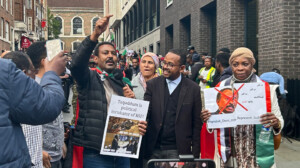Sudan welcomes Independence Day amid fresh waves of protest
Protests that began on December 19 against a rise in bread prices are continuing; over the weeks, demonstrations are increasingly focused on demands that Omar Al Bashir and his government be removed from power.
 Protestors demonstrate in Sudan on 19 December 2018 (file photo)
Protestors demonstrate in Sudan on 19 December 2018 (file photo)
Protests that began on December 19 against a rise in bread prices are continuing; over the weeks, demonstrations are increasingly focused on demands that Omar Al Bashir and his government be removed from power.
Yesterday, the largest protest took place in El Managil locality in El Gezira where hundreds of people took to the streets to demand the ousting of President Omar Al Bashir and his party from power.
Witnesses told Radio Dabanga that one demonstration was formed by residents of El Huda and surrounding villages, while another demonstration began in El Ugda, adjacent to El Huda. The demonstrations took place on Saturday to demand an “overthrow of the regime.” Protestors were met by the security services who reportedly used sticks, batons, and tear gas to disperse demonstrators. Demonstrators reportedly began burning El Managil locality offices and other government buildings. Witnesses told Radio Dabanga that a force of 30 vehicles loaded with soldiers and security services confronted demonstrators with excessive violence and arrested a number of citizens who were not counted.
Al Bashir’s security forces have responded to protests across the country by cracking down severely and continually. Thirty-seven people were killed in the protest’s first five days, according to Amnesty International. On Sunday, The Guardian (UK) reported that the number has risen to more than 60.
The Sudanese government this week admitted that 19 have died, including two members of security forces, during the protests. Also, it said that 219 people were wounded.
Memorandum submitted in Brussels
On Saturday, hundreds of people demonstrated in Brussels in support of the uprising in their home country, condemning the killing of peaceful protesters and shouting to topple the regime and hand its leader Omar Al Bashir to the International Criminal Court. Protests have become increasingly focused on the toppling of the regime and removal of Al Bashir from power.
Members of various civil society organisations in Belgium participated in the demonstration. The protesters called on EU countries to protect the peaceful demonstrators and support their demands. The protest march moved from the building of the Commission of the European Union to the building of the European Parliament. The demonstrators submitted a memorandum to the EU Commission President, EU External Affairs Officer, and the EU Commission on Human Rights.
Elsewhere, Sudan ‘uprising tracks’ are becoming increasingly popular.
Arrest of protest organiser
On Saturday evening, members of the National Intelligence and Security Service (NISS) held Siddig Abufawaz, chairman of the Socialist Unionist Party after a raid on his house at El Safiya in Khartoum North. Abufawaz is also a prominent member of the National Consensus Forces, an alliance of Sudanese opposition parties, that is co-organising the protests against the government of President Al Bashir.
Speaking yesterday to police leaders in Khartoum, Al Bashir stated that “Sudan is facing an economic challenge, yet despite the struggles it is going through, it is better than others concerning security and stability,” adding that “subversion, destruction and looting deepen and increase the problem rather than leading to its resolution.”
Al Bashir delivered a nationwide address to mark Sudan’s independence from the British Empire on Monday evening.











 and then
and then